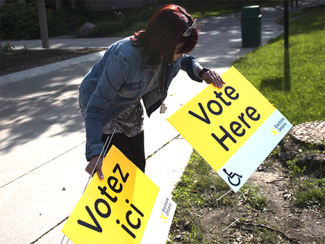ONTARIO AGONISTES
More votes, less democracy in Ontario election results

PROGRESSIVE CONSERVATIVE DOUG FORD WAS ELECTED PREMIER OF ONTARIO ON JUNE 7.
The good news is voter turnout jumped seven points to 58.4%—a record high in Ontario for this century. The sad news is the first-past-the-post voting system again distorted the distribution of seats. Thus the PCs will govern with a majority of seats in the provincial legislature, even though they did not get a majority of votes province-wide.
The PCs got just 40.5% of the popular vote, but got 63.3% of the seats in the legislature (76 of 122).
The Liberal and Green Party results were also distorted: the Liberals got 19.59% of the popular vote, but were left with just 5.7% of the seats (7 of 122); the Green Party got 4.6% of the popular vote, but were relegated to 0.82% of the seats in the legislature (1 of 122).
The NDP result was closer to fair: the party got 33.56% of the popular vote and got 32.7% of the seats in the legislature (40 of 122). Enough to make them the official Opposition.
None of that changes the fact that the Doug Ford majority is legitimate and fair—as legitimate and as fair as any ever is when using first-past-the-post voting. There is no reason for him to hold back on bringing the big changes to Ontario he promised. The expectation is he will.
What lies ahead for Ontario?
Ford is a millionaire-by-inheritance who never did issue a fully-costed election platform. He promised to cut personal income taxes by 20%, gas by 10 cents a litre, Hydro bills by 12%.
Ford also said he would eliminate a carbon tax and a cap-and-trade system. It is estimated just those cuts will cost the government $10 billion in lost revenue.
All these cuts would leave the province with a lot less money to run and maintain public services. Ford said he would make up the shortfall by finding unnamaed “efficiances” that would reduce the cost of government by $6 billion.
However, experts estimate the cost of all of his promises could rise to $25 billion over the next three years.
Mainstream economists have predicted a $6.9 billion deficit in Ford’s third year and a $7.6 billion deficit in his fourth year—higher than what would have been incurred by the platforms offered by the NDP or the Liberals. But history suggests that even running huge deficits will not eliminate the drive to make deep cuts—particularly to social programs and jobs in the public service.
If Ford actually acts on his promises life in Ontario will change in many ways. Developers can be expected to have a freer hand, even if Ford abandons his pledge to allow development of the Greenbelt.
A further increase to the minimum wage due this coming January will be cancelled. Ford’s alternative is a tax credit that will only reach one third of workers earning under $30K per year.
On the social front, he will repeal the previous government’s sex education curriculum and try to outlaw pro-Palestinian demonstrations.
In addition, Ford opposes “bubble zones” to protect women seeking abortion in clinics from harassment. He favours restricting abortion, and will allow back-benchers to introduce legislation to that effect. Spending cuts to other programs affecting women are also likely to be in jeopardy.
Doug Ford has a way of making things up as he goes along. He is just as likely to keep all his promises as he is to forget them and make up new ones. That means predicting significant change in Ontario is a no brainer. Not knowing exactly what kind of change that might turn out to be has all Ontario holding its breath.
- 30 -












Add new comment